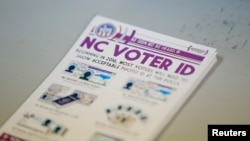A divided U.S. Supreme Court on Wednesday refused to reinstate North Carolina's controversial voter identification requirement.
The court rejected the request by Republican Governor Pat McCrory to reinstate the law that the 4th U.S. Circuit Court of Appeals said "disproportionately affected African-Americans'' in North Carolina.
The appeals court struck down several parts of the law last month, saying they had been approved by Republican legislators in 2013 with intentional bias against black voters.
As a result of the Supreme Court action, early voting in this year's presidential election will extend for 17 days, and voters will not have to present photo identification at their assigned precincts.
McCrory said Wednesday that North Carolina "has been denied basic voting rights'' by the decision, and that "four liberal justices'' had "blocked North Carolina protections afforded by our sensible voter laws.''
The high court divided 4-4 on most of the challenged provisions, with the four more conservative justices supporting the state's bid. The split illustrated again how closely divided the Supreme Court is on voting rights and how the outcome of the presidential election essentially will determine the court's direction.
The court has been operating with only eight members since Justice Antonin Scalia died in February.
The voting adjustments could benefit Democrats in the November election, because registered Democrats historically have favored using early voting. Evidence presented during the trial over the 2013 law said black residents disproportionately lacked a photo ID. Black voters traditionally have voted overwhelmingly Democratic in North Carolina.
Democratic presidential nominee Hillary Clinton called the decision "great news for North Carolinians.''





